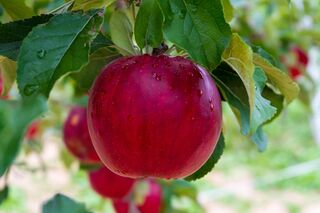Genetics
Am I Becoming My Mother?
Like it or not, you are a chip off the old block.
Posted November 16, 2021 Reviewed by Michelle Quirk
Key points
- In profound adaptations or the simplest mannerism, our parents’ qualities creep into our being whether or not we want them.
- Exploring the parental traits passed on — the positive and negative — helps a person better understand his parents and himself.
- Inherited characteristics that live on in you can shift the relationship with your parents and affect the life you live today.

How far did the apple fall from your family tree?
In large or seemingly small imperceptible ways, bits and pieces of our parents seep into our beings — in the smile reflected in our mirrors, in the voice we use to reprimand our children, in a talent for storytelling or love of psychics or sports.
When my son was in high school, one of the young ladies in our carpool wore what I considered excessive makeup. I thought it odd that eyeliner, face makeup, and lipstick in heavy layers covered her face at 8:15 in the morning until I met her mother. The daughter was a duplicate version of her mother, looking provocative, more ready to go to the prom than sit in classrooms all day.
From time to time, you may stumble upon physical features or mannerisms or habits you share with a parent. But the likenesses can go much deeper as essays by 25 well-known writers such as Ann Pachett and Jane Hamilton tell us in Apple, Tree: Writers on Their Parents.
A Chip Off the Old Block
“Children aren’t supposed to see their parents. If all goes well, a parent’s life is under wraps, and all the child sees is what they can depend upon; they see safety and pay it no mind,” notes Sallie Tisdale, Apple, Tree contributor and recipient of many literary awards. Yet, as Tisdale herself notes, in profound adaptations or the simplest expressions, our parents creep in whether we want them to or not. It’s almost unavoidable.
For instance, I’m obsessive about being late, a characteristic I believe came from my mother screaming at my brother and me to “Hurry up, we are going to be late” whenever or wherever we might have been going. It was not pleasant, and I cringe when I often shout the very same words.
You may be adamant that you won’t become your parent and work hard to achieve that goal. You could worry about what’s being passed down your family tree, perhaps melancholy or fears or abusive or aggressive behavior. It’s human nature to try to avoid, dismiss, or ignore troublesome qualities, but what many of the Apple, Tree writers observe is that the most troubling qualities can lead us to more compassion and understanding, of the parent as well as of ourselves.
The Apple Doesn’t Fall Far From the Tree
As a child, you “see” your parents as pieces of the apple trickle in without your realization, and sometimes a trait is deeply embedded before we notice or take the time to figure out how it happened. For example, in her reflection, “One Man’s Poison,” Kyoko Mori writes,
During my father’s lifetime, it never occurred to me that I was anything like him…I’m not a liar or sexual adventurer.…I chose not to have children so I never had to worry about becoming a terrible parent like my father, who teetered between neglect and domination, indifference and rage…My father’s poison allows me to move through a world full of betrayals and failures without taking everything to heart.
That’s because she realizes, “I survived being his daughter by acting just like he did.”
On the other hand, you may welcome characteristics or habits you view as positive — a parent’s spirit of adventure, generosity toward strangers, or love of food. In her essay, novelist and NPR correspondent Karen Grigsby Bates explains, “Our mother came from a long line of people who had inherited what we’ve named the Feeding Gene.” Bates describes in delicious detail how her in-laws, cousins, and other family members have the gene. I, too, inherited the Feeding Gene from my mother and grandmother; as Bates notes: “There’s always something to turn into dinner” for whoever might arrive unexpectedly. Like the positives and negatives from our parents, “the Feeding Gene will continue in my family long after I’ve left the earth,” Bates points out, as it will in mine.
What inherited qualities or traits have you absorbed from the people who raised you? Did the discovery of them alter your sense of self? Your understanding of your parents? Your parenting style?
Copyright @2021 by Susan Newman
Related:
The Best Way for Adult Children and Parents to Communicate
How Close is Too Close in Mother-Daughter Relationships?
If you would like to comment, please see my Facebook page.
References
Funderburg, L., ed. (2019). Apple, Tree: Writers on Their Parents. Lincoln, Nebraska: University of Nebraska.


